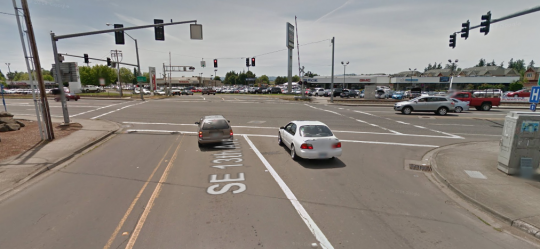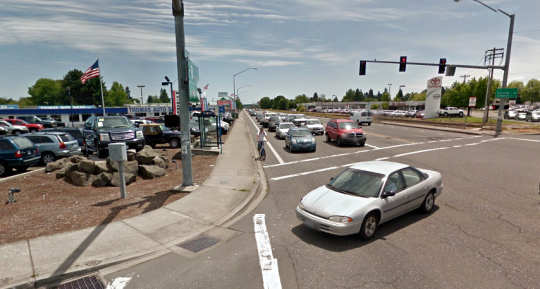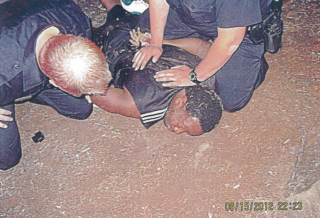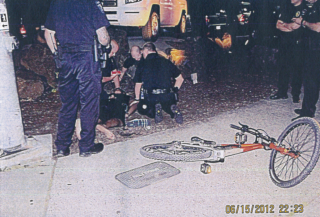
(Image: Google Street View)
The City of Hillsboro and two of its police officers may head to trial this fall over a largely unreported 2012 incident in which the officers Tasered a 39-year-old Hillsboro man and kneed him into the ground after he allegedly rolled through a “don’t walk” light on his bike and then refused to give his name.
The interaction escalated over the course of three minutes from an evening traffic stop to a Taser-assisted takedown of a man who by all accounts had never attempted to physically harm the officers, though he did pull away from them when they tried to restrain and tackle him without warning.

lawyer, Edie Rogoway. Also pictured is his wife Vivian.
Rogoway said the couple received matching bicycles
as wedding gifts from her sister’s family.
Two police officers involved in the incident, Ofc. William Blood and Ofc. Brian Wilber, said the man with the bike, Jermaine Robinson, at one point seemed to be preparing to pedal away against Blood’s order.
Robinson’s lawyer said both he and a witness have denied that he ever moved to leave. Robinson also says Blood, the detaining officer, refused to tell him what violations he was accused of.
Blood said that he told Robinson about the violations the moment he emerged from his car, overhead lights flashing behind him, to approach the man on the Tualatin Valley Highway sidewalk.
Robinson was half a mile from his house.
Blood also said that after deciding to take Robinson into custody for refusing to identify himself, Blood didn’t start by telling Robinson to cooperate, because he didn’t want to “tip him off and give him an unfair advantage in preparing for a physical confrontation.”
Instead, Blood said he began the arrest process by locking a handcuff around Robinson’s wrist while the man wasn’t looking. According to Blood’s report, Robinson responded by jerking his wrist away and preventing the two officers’ attempts to wrestle his hand behind his back. Robinson “barely budged,” according to two police officers, as they then attempted to knock him to the ground.
As Robinson remained in place, apparently still straddling his bicycle, a second officer drew a Taser and fired at him, sending Robinson to the ground. As Robinson struggled to rise, the police report said, the second officer fired the Taser again and the first officer tried to subdue him by kneeing him in the back.
Robinson was charged with resisting arrest and other charges and taken to jail.
During the takedown, Robinson’s lawsuit says, he received “serious physical injuries including a herniated disc in his lumbar spinal region, which will require surgery followed by intensive rehabilitation.”
At Robinson’s eventual criminal trial, in May 2013, a jury found him guilty only of a pair of traffic infractions: biking without lighting and crossing the street against a traffic light.
The incident and criminal trial don’t seem to have drawn media coverage at the time. But the event reentered the public eye last June when Robinson filed a federal civil suit against the city and the two officers who’d stunned him with a Taser gun.
The federal civil suit finishes its discovery phase today. Unless a judge throws the lawsuit out in the coming weeks, it’s likely to go to trial this fall.
Robinson, the man who was biking, is black. The involved officers are white. Robinson’s lawyer in the civil case, Edie Rogoway, discussed the case this week on her client’s behalf. The lawyer for the officers and city, Gerald Warren, didn’t respond to two calls over the last month.
This article is based mostly on Robinson’s June 2014 civil complaint and on two other public records, previously unreported: the initial incident reports from the police officers involved and the officers’ July 2014 response to the civil complaint.
Advertisement
The incident began at 10:17 p.m. on Friday June 15, 2012, when Robinson was pedaling eastward on the north sidewalk of Tualatin Valley Highway, about half a mile from his house.
Rogoway said in an interview Monday that her client had been out to exercise, something he often did with his wife Vivian.
“He had a regular course that he did almost every night,” Rogoway said. “It happened to be that one night where she was tired and didn’t want to go.”

According to the incident report by Ofc. Blood of the Hillsboro Police Department, Robinson was biking without a front headlight, which is illegal in Oregon. Blood was westbound in his patrol car at the time, stopped at a westbound red light and facing Robinson.
Also in the patrol car with Blood was Kristi Allen, a civilian whose husband, according to Rogoway, had been a childhood friend of Blood’s. Allen’s husband had ridden along with Blood on a recent shift, Rogoway said, and she was following suit.
According to Blood, Robinson stopped with his bike on the sidewalk at the northwest corner of Tualatin Valley Highway and SE 13th Avenue, looked around (including at Blood’s car), then proceeded across the crosswalk even though he should have had a “don’t walk” signal phase. (Robinson later maintained that he didn’t see any “don’t walk” signal, Rogoway said.)
At that, Blood flipped on his car’s overhead lights, pulled over and got out of his car. Robinson, he said, rode up to him and stopped.
“I explained to the male why I was stopping him, initially citing his not having a headlight and not obeying the traffic signal.”
— Ofc. William Blood, in a police report about the first moments of his meeting with Robinson
Here’s Blood’s version, in his police report, of what happened next:
As I walked up to the male, I saw he had a disgusted/angered look on his face. The male stared at me initially with squinted eyes and furrowed eyebrows. I told the male “Hi” and asked how it was going. The male did not reply to me other than giving an unintelligible grunt. I explained to the male why I was stopping him, initially citing his not having a headlight and not obeying the traffic signal.
In his subsequent legal complaint, Robinson said this last part, informing him of the violations, never happened, or at least that he had not heard it at the time.
Blood’s account continues:
The male was slightly shorter than me (I am 6’1″ tall) and appeared to weigh about 200 pounds. As the male was wearing shorts and a tank top, I could see he appeared to be in very good physical condition. The male had a noticeable muscular build.
I asked the male if he had identification, and he said no. I asked the male for his name. The male stared at me and in a matter of fact tone said, “You don’t need my name.” Given the male’s apparent agitated mental state, his instant defiance, and lack of cooperation, I asked for a second unit respond to my location. I told the male I did need his name because I was stopping him for multiple traffic violations which could result in a citation. In a mixed tone of anger and disbelief, the male said, “A citation?!?!”
I told the male yes. I told the male again I needed his name. The male continued to be defiant and said I did not need his name. I told the male, “I am ordering you to give me your name.” Again, in a mixed tone of anger and disbelief, the male loudly said, “You’re ordering me?!?!?” I told the male he could give me his name or be placed under arrest. The male said, “For what?!?” I told the male he was interfering with my duties by refusing to give his name.
It’s not clear, from Robinson’s subsequent and less detailed legal filings, whether in the moment of being approached by a police officer who got out of his car to approach him, Robinson might have failed to register the officer’s initial explanation of why he was being detained, or whether Blood might have failed to explain it.
Whatever the case, Blood’s account of this exchange is consistent with Robinson’s later account that “Blood refused to respond to Plaintiff’s inquiry as to why he was being questioned and detained.”
Here’s the next part of Blood’s account:
I asked the male yet again for his name. The male said, “I’m leaving.” The male stood up on his bike and started to pedal.
This is one of the key facts under dispute. Blood’s civilian passenger, Allen, was sitting in the car watching the incident, and during Robinson’s criminal trial offered a different account of the story.
“She said that she had a clear view of the entire incident,” Rogoway said in an interview Monday. “When asked if Mr. Robinson attempted to ride away, she very firmly said no, he had his feet very firmly planted on the ground and his hands planted on his handlebars.”
Allen couldn’t be reached by phone this week. A call to a Washington County resident with her name wasn’t returned.
“I grabbed hold of the male’s left wrist and told him to stop. The male immediately tensed his arm, creating a very rigid muscle tone and angrily said, ‘Don’t touch me!'”
— Ofc. William Blood, on his first physical contact with Robinson
Here’s more from Blood’s account, from right after Blood says Robinson seemed to be preparing to bike away:
I grabbed hold of the male’s left wrist and told him to stop. The male immediately tensed his arm, creating a very rigid muscle tone and angrily said, “Don’t touch me!” The male had stopped his efforts to pedal away, so I broke physical contact with him. I told the male he was not free to go.
At this point, I got on the radio and asked my cover to “step it up.” When I broadcast this, it was my intent to communicate to cover officers I needed an expedited response. Given the male’s aggression and defiance, i did not feel safe to conduct an extended radio transmission about his hostile behavior.
At this point, the second Hillsboro officer, Brian Wilber, arrived. Here’s a passage from his report (throughout which he refers to Robinson as “Johnson,” apparently in error):
Upon my arrival I observed the suspect Jermaine Johnson sitting on a bicycle on the east side of the intersection. Officer Blood was holding Johnson’s left arm. As I exited my vehicle I heard Officer Blood tell Johnson he wasn’t free to go. Johnson placed his right foot on the peddle and his right hand on the handle bars. Johnson attempted to ride off. Officer Blood was able to stop him and Johnson stood back up with both feet planted on the ground.
Back to Blood’s account:
With Ofc. Wilber now on scene and the male stopping his attempts to leave, I asked him yet again for his name. The male told me he was not giving it to me. I told Ofc. Wilber, “hands on” to indicate I was going to take the male into custody. I did not directly tell the male to put his hands behind his back because I did not want to give him the chance to bring his arms around to his front and/or prepare for a fight. I felt that given the male’s hostile, angry and defiant demeanor, giving him the simple command of “put your hands behind your back” would tip him off and give him an unfair advantage in preparing for a physical confrontation. I believed this due to the male trying to ride off and becoming instantly angry/rigid when I put my hands on him to stop him.
“I felt that given the male’s hostile, angry and defiant demeanor, giving him the simple command of ‘put your hands behind your back’ would tip him off and give him an unfair advantage in preparing for a physical confrontation.”
— Ofc. William Blood, on his decision to abruptly handcuff Robinson rather than inform him that he was under arrestThe male was focused on Ofc. Wilber. The male’s left hand was down to his side and his right hand was on his bicycle handle. I removed my handcuffs, took a hold of the male’s left hand and simultaneously put the handcuff on his left wrist. The male immediately tensed up and became stiff/rigid. The male aggressively tried to pull his left wrist away from me, physically moving me in the process. Ofc. Wilber attempted to move the male’s right hand behind his back. I told the male to bring his right hand behind his back and to stop resisting.
Robinson did not do so, Blood reports.
I feared a physical confrontation with the man was imminent. Ofc. Wilber and I, two people, were unable to manipulate or control the lone male. We could not even move him. I did not want a physical confrontation to spill onto the highway where he or we could be struck by a vehicle. I saw the male was still straddling his bike. I felt the safest option at this point was to try to take the male to my left (away from the highway) and down to the ground. Even with the male stiff and rigid, I felt with the element of surprise and him being on his bike and possibly off balance, I could get him to the ground.
I still had a hold of the male’s left wrist, as I had a handcuff attached to it. I jerked the hand down and to the side in an effort to bring the male off his bike and down to the ground. This only irritated the male, who stiffened up further and barely budged. I was shocked this did not even knock the male off balance.
Ofc. Wilber told me to disengage so he could deploy a Taser. I stopped my effort to take the subject to the ground but still held on to his left wrist. I did not want to give up control of the male’s left wrist and allow him to essentially have a weapon by using the handcuffs attached to his hand. Although one end was attached to the male’s end, the other hand would have been dangling free and could have been used as a striking device to injure myself or Ofc. Wilber.
Ofc. Wilber drew his Taser, turned it on and pointed it at the male. I heard Ofc. Wilber tell the male to put his hands behind his back or he would be tased. The male failed to comply with the command to put his hands behind his back. I saw Ofc. Wilber was about to deploy the Taser. I let go of the male’s left hand just as Ofc. Wilber deployed the Taser, striking the male. The male fell over to his left, going down to the ground.
After the male fell, I went down to the ground with him, the Taser still cycling. I regained control of the suspect’s left wrist/arm. Ofc. Wilber came to the ground, too. After the Taser had stopped cycling, the male instantly combative again, trying to bring his arms in, rolling on the ground, and trying to sit/stand up. It was obvious to me Ofc. Wilber and I were not going to be able to take the male into custody by ourselves.
At this point Blood radioed a “code three,” a request for multiple officers to respond with lights and siren.
As we were on the ground, the male’s right hand made a straight, distinctive dive motion towards his waistband. Fearing the male was going for a weapon, I reached down to his hand and knocked it away. Around this time, Ofc. Wilber deployed the Taser a second time. I heard Ofc. Wilber scream in pain, leading me to believe he received part of the Taser application due to the large amount of Taser wires strewn on the ground. I did not know immediately how much of an effect Ofc. Wilber suffered. The male was continuing to resist by pulling away. I told the male to stop resisting. The male was on his left side, his back to me. Using my right knee, I delivered a single knee strike to the middle of the male’s back in an effort to stun him and get his right arm to relax. This knee strike proved futile.
That was essentially the end of the struggle, however, as several more patrol cars began pulling up. The encounter to this point had taken about three minutes.
Here’s Robinson’s summary of what had just happened:
Defendant Blood refused to respond to Plaintiff’s inquiry as to why he was being questioned and detained, and when Plaintiff asked if he was free to leave, Defendants Blood and Wilbur violently grabbed Plaintiff and threw him off his bicycle. Plaintiff was then Tasered twice by Defendant Wilbur, thrown to the ground, and hit with a knee strike in the back by Defendant Blood, causing Plaintiff to sustain serious injuries.
Robinson’s lawsuit charges that Blood “intentionally engaged in profiling of Plaintiff, based on his race” and “treated Plaintiff differently from similarly situated Caucasians.”
In their answer to Robinson’s lawsuit, the lawyer for the two police officers and for the city denied this entire paragraph without further elaboration.
“The amount of force used was at all times justified and an appropriate response to plaintiff’s resistive behavior,” the defendants’ answer went on. “The defendants at all times had probable cause to believe plaintiff had committed violations and/or crimes for which his detention and arrest were consistent with Oregon and United States law.”
A nationwide search on Wednesday of criminal records for Robinson, by the site Intelius.com, turned up two incidents: one case of failing to display a driver’s license and the 2012 resisting arrest charge, of which he was later acquitted.
Rogoway, Robinson’s lawyer, said the prior incident had happened in 2006, when Robinson had been pulled over while driving a car owned by his brother-in-law that had expired license tags.
Robinson’s lawsuit charges that Blood’s and Wilbur’s actions were “malicious, deliberate, intentional, and embarked upon with the knowledge of, or in conscious disregard of, the harm that would be inflicted.” It also charges that Blood “intentionally engaged in profiling of Plaintiff, based on his race” and “treated Plaintiff differently from similarly situated Caucasians.”
As for the City of Hillsboro, the lawsuit charges among other things that “Hillsboro Police Officers have made other similar false arrests, and The City has expressly encouraged or acquiesced in this unlawful behavior; has ratified said conduct through the internal affairs process; and/or tacitly encouraged or acquiesced it by failing to train, supervise, or discipline its officers, thus evincing deliberate indifference to Plaintiff’s constitutional rights.”
The lawsuit seeks unspecified compensation for damages, punitive damages, attorney’s fees and costs.
In a brief interview last month, Hillsboro spokesman Patrick Preston repeated the statement he issued to The Oregonian for a brief article last June:
We are aware of the litigation. The allegations do not describe the manner that we, as a city, serve our community. We welcome diversity here and we have established a culture of respect and customer service.
___
Publisher’s note: In 2008, Portland Police Bureau officers tackled and Tasered a man who refused to stop for a plainclothes police officer while biking without a front light. The man, Phil Sano, was charged with resisting arrest but was ultimately found not guilty. See all our coverage of that incident here.
Correction 4:40 pm: A previous version of this post inaccurately described the Sano incident immediately above.



